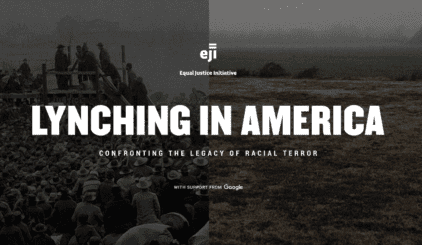 A year and a half ago, I wrote about my experience of standing under a beautiful tree, a tree that stretched its branches to the heavens in praise of its Creator, a tree that had been co-opted into the lynching of four black men.
A year and a half ago, I wrote about my experience of standing under a beautiful tree, a tree that stretched its branches to the heavens in praise of its Creator, a tree that had been co-opted into the lynching of four black men.
During that same afternoon, we visited the site of a future National Lynching Memorial in Montgomery, Alabama.
Racial terror is not a problem limited to the deep South, and it’s not a distant memory. In Maryland, just a few miles south from where I now live, there were 28 reported lynchings between 1877 and 1950. My home state of Oregon didn’t ratify the 15th Amendment until nearly 90 years after it was written, and was admitted to the United States with a clause in its constitution excluding black and mixed-race peoples. Ask me if we learned that in our state history classes in school.
The Equal Justice Initiative has launched a new website, Lynching in America, which provides an interactive experience based on their powerful written report. This website reminds us of our own proximity, both physical and chronological, to the legacy of racial terror in the United States. As uncomfortable as it may be, I hope our non-POC readers take the time to become familiar with some of the faces and stories of men and women whose lives were cut short by racial violence. Because if you’re a white person living in this country, no matter how old you are or what state you’re from, lynching and racism are a part of both your history and your current reality.
Take the time to become familiar with some of the faces and stories of men and women whose lives were cut short by racial violence.
It’s been twenty years, but I have a vivid memory of explaining to one of the only students of color in my high school that “racism wasn’t a problem anymore.” And not too long ago, I realized that I had made a biased (and wildly incorrect) assumption about a man based entirely on his country of origin. I don’t have to go too deep into my Facebook feed to find someone responding to the extra-judicial shooting death of an unarmed black person with the phrase, “Blue Lives Matter.”
Here’s a quick video that has both helped me remember some of the important lessons I’ve learned in the last twenty years, and also reminds me how to respond concisely and compassionately to people who might still be struggling. Our whitewashing over the truth of racism has got to stop.
Sarah Withrow King is the Deputy Director of Christians for Social Action, the co-director of CreatureKind, and the author of two books, Animals Are Not Ours (No Really, They’re Not): An Evangelical Animal Liberation Theology(Wipf & Stock) and Vegangelical: How Caring for Animals Can Shape Your Faith (Zondervan).


